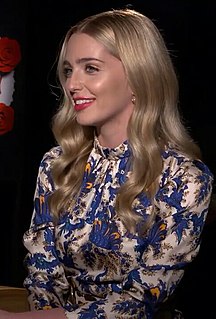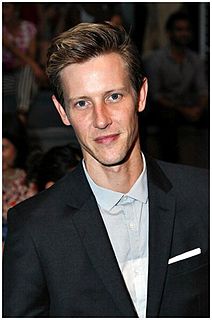A Quote by Tao Lin
If I wrote about "being [abstraction]" I would be ignoring existential issues (such as death, limited-time, the arbitrary nature of the universe, the mystery of consciousness) that I feel affect me most in my life and think about most of the time. Another reason is that it doesn't seem specific or accurate, to me, to write about "being [abstraction]." I think there are some other reasons.
Related Quotes
I have no business being a journalist. I'm the least, I'm the least - I'm the most trusting, I absolutely make a habit of believing anything that anybody tells me about themselves. I've never had any reason in the world to think that anyone has wanted to harm me, or lie to me. I believe whatever is being sold, most of the time.
I think I've learned a lot about how to make movies, and particularly about how to edit movies by thinking about how similar problems are resolved in other forms. The issues in all forms are the same in an abstract sense, aren't they? Characterization, abstraction, metaphor, passage of time... Whether it's a movie, a novel, a play, or a poem, those issues exist. And each person resolves them differently.
I think there's something really painful about your identity being entirely composed of ghosts. For me, I didn't want to be this kid whose Dominicanness was something caught utterly in the past, is an abstraction, the thing that I write about. Instead I wanted it to be, first and foremost, a thing that I lived.
I think that most of us, anyway, read these stories that we know are not "true" because we're hungry for another kind of truth: the mythic truth about human nature in general, the particular truth about those life-communities that define our own identity, and the most specific truth of all: our own self-story. Fiction, because it is not about someone who lived in the real world, always has the possibility of being about oneself. --From the Introduction
In the development of the understanding of complex phenomena, the most powerful tool available to the human intellect is abstraction. Abstraction arises from the recognition of similarities between certain objects, situations, or processes in the real world and the decision to concentrate on these similarities and to ignore, for the time being, their differences.
Abstract understanding doesn't mean arbitrary sloshing and messing. Abstract art is controlled visual magic based on laws and methodology. Abstraction generally involves implication, suggestion and mystery rather that obvious description. Like a good poem, a good abstraction attacks your feelings before your understanding. Abstraction within realism adds zest and excitement to otherwise dull subject matter. Abstract understanding takes time and patience.
I think that music is still a mystery to most people. It kind of goes through most people without a specific thought. They feel the music, which is what's supposed to happen. They're not supposed to be curious about who wrote the music; they're supposed to feel what the show is trying to get them to feel. So if I help get that feeling across, that's good enough for me.
I had nothing to do with death panels. I thought it was a horrible phrase about end of life. I didn't think it was accurate, and I was - I've always been opposed to it. The reason why I stood behind that phrase "death tax" for so many years is because the only time that you could pay that tax, the only time, is on the death of a relative. And that's what makes it a death tax. You have to be accurate.
One of the reasons it's important for me to write about war is I really think that the concept of war, the specifics of war, the nature of war, the ethical ambiguities of war, are introduced too late to children. I think they can hear them, understand them, know about them, at a much younger age without being scared to death by the stories.
I took to writing as my medicine to help me stay afloat in acting career journey. I wrote about me breaking hearts, and my heart being broken. I wrote about my views whether they were liberal or conservative. I wrote about everything. I wrote about my life. When I did not have paper coming in as green backs, I'd use random pieces of paper for stories. It was like, I got no money, but I have paper to write. So I wrote.
Every time we watch a little story play out inside our head, we're fantasizing, whether we realize it or not, and it seems to me that, though succumbing to fantasies about other people can be dangerous or self-defeating, the act of fantasizing itself is also an essential part of being human, of being capable of both abstraction and empathy.
Our time on Earth is already short enough. For me, it's like every single day I try to be as happy as I can. It's crazy to think about. We never have enough time. That's always the thing. We always want to do more. So it's about being able to spend time on the things that are most important to you. Life is a lot easier that way, and obviously life is pretty difficult a lot of the time.
Everyone always asks, was he mad at you for writing the book? and I have to say, Yes, yes, he was. He still is. It is one of the most fascinating things to me about the whole episode: he cheated on me, and then got to behave as if he was the one who had been wronged because I wrote about it! I mean, it's not as if I wasn't a writer. It's not as if I hadn't often written about myself. I'd even written about him. What did he think was going to happen? That I would take a vow of silence for the first time in my life? "
I think there's a little more attention to human needs than to property rights. But I don't think much of political activism. It's so shortsighted. Most people are interested in their own personal comfort. I've said that about environmentalists. I think they care about bike paths and places to park their Volvos, not the planet as an abstraction.







































